Your Guide to Construction, Renovation, and Zoning Laws in Michigan
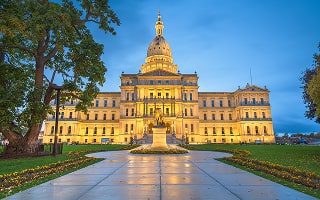
Investing in real estate has long been considered one of the most effective ways to generate wealth, as it tends to appreciate over time. However, renovating and building new construction is subject to many rules and regulations. So, before buying any land or buildings in Michigan, be sure to familiarize yourself with the property-related regulations regarding construction, renovation, and zoning. Michigan has a total of 4,670,131 housing units. According to the U.S. Census Bureau, a vast number of these (72,9%) are owner-occupied. The median value of these homes is $217,600.
Property-related laws fall into two general categories: state-level and local (town/city/county/municipality). Each state divides property law responsibilities between these two entities; some laws fall to the state and others to local government. Under each main category, there are many different rules and regulations to review.
State Level (Regulations & Codes)

The state of Michigan uses the Michigan Building Code (MBC) as its primary base for building codes. These codes were derived from the International Building Code (IBC) with Michigan-specific amendments, deletions, and additions. Enforcement of the MBC began on May 1, 2025, and covers many aspects of construction, alteration, and maintenance of buildings.
Michigan's Bureau of Construction Codes (BCC), within the Department of Licensing and Regulatory Affairs (LARA), works closely as a team to develop, adopt, and enforce the state's building codes. They do this through a program of code compliance, investigation, and training. Their main goal is to preserve the building environment and systems, which must be safe, sound, and sanitary. Additionally, they aim to keep building workers safe, healthy, and well. The BCC was founded through the Stille-DeRossett-Hale Single State Construction Code Act (1972 PA 230). Some of the key responsibilities of the BCC are:
- Developing and adopting national standards for construction.
- Making adjustments to local codes.
- Enforcing building codes.
- Ensuring safety and sanitation in the built environment.
- Investigating and training to ensure consistent application of standards.
- Performing inspections on buildings, electrical, mechanical, plumbing, and mobile home parks.
Along with the Michigan Building Code, the state also has the following other construction-related codes:
- Michigan Residential Code
- Michigan Plumbing Code
- Michigan Mechanical Code
- Michigan Electrical Code
Construction
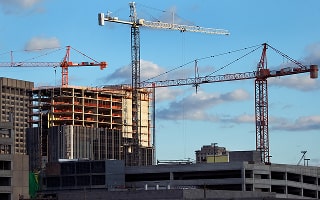
Michigan construction laws cover a wide range of topics, including building codes, construction liens, and construction zone driving rules. The Michigan Building Code (MBC) governs the building codes and safety regulations during construction.
Subcontractors working on private projects must adhere to specific procedures, including "Notice of Furnishing", to protect their right to file a construction lien.
Drivers must be aware of reduced speed limits and traffic direction in construction zones and must adjust accordingly.
Some of the highlights of construction laws in Michigan include:
-
Michigan Building Codes: The state uses the International Building Code as a foundation, with its own amendments and additions, to ensure safety and quality in construction.
-
Construction Liens: On private projects, subcontractors must send a Notice of Furnishing within 20 days of providing labor, materials, or services to be able to file a claim of lien later if they are not paid for their services/materials.
-
Construction Zones: Michigan law mandates that drivers must reduce their speed in construction zones, typically 45 mph but potentially lower depending on signage. Construction workers also have the authority to direct traffic within these zones.
-
Public Works Projects: For public works projects, subcontractors must send an initial notice of claim on a bond instead of a notice of furnishing.
-
Zoning: Michigan has various zoning laws, building permits, and environmental regulations that affect construction (both residential and commercial).
Commercial Structures
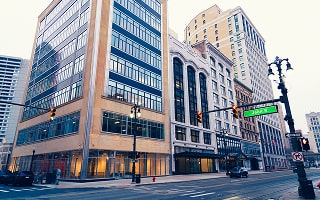
Michigan commercial construction laws focus primarily on the Michigan Building Code (MBC) and local regulations. Commercial contractors must adhere to the MBC and comply with any local relevant ordinances. Most projects require building permits, but other laws also apply.
Some key areas of the commercial construction laws in Michigan include:
- Michigan Building Code (MBC): The Michigan Building Code (MBC) is based on the International Building Code with Michigan-specific modifications. It governs the construction, alteration, and maintenance of buildings and other structures in Michigan. Michigan uses the 2021 version of the International Building Code.
- Single State Construction Code Act: The Single State Construction Code Act, along with its amendments, provides the framework for building codes in Michigan.
- Contractor Licensing: Unlike residential construction, there is no state-wide license requirement for commercial contractors. However, there are still other regulations to be aware of.
- Local Ordinances: General contractors involved in commercial construction must contact their local county building official to determine specific permit and licensing requirements.
- Local Licensing: Although the state does not require commercial contractors to be licensed, some cities or counties might have their own licensing rules for commercial contractors.
- Residential Builder's License: A contractor may need a Michigan residential builder's license or show they can obtain one, especially if the project involves residential components within a commercial development.
- Permits: Commercial construction projects will require various permits, and these are usually obtained at the local level.
- Energy Conservation Standards: The MBC includes energy conservation standards that must be followed.
Residential Structures
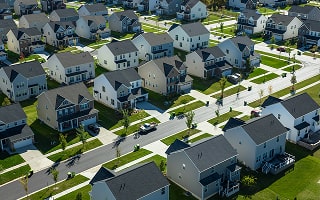
Michigan has specific laws regulating residential construction, including licensing requirements for contractors and regulations regarding building permits. Homeowners can act as their own general contractor for their single-family residence, but generally, any construction or alteration work that impacts the structure or is exterior requires a permit.
Some of the highlights of residential construction laws in Michigan include:
- Contractor Licensing: Michigan requires residential builders to be licensed for any maintenance or renovations. The Michigan Licensing Law outlines these requirements, and the Residential Builders' and Maintenance and Alteration Contractors' Board is responsible for licensing and regulating residential contractors.
- Building Permits: Permits are generally required for exterior work, such as siding, roofing, and concrete work, as well as for interior work that involves structural changes. Cosmetic interior work like painting or replacing flooring typically doesn't require a permit.
- Homeowner Exemption: Michigan law allows homeowners to act as their own general contractor for their own single-family residence.
- Construction Contracts: Residential construction contracts must be in writing and include the contractor's license number (if required) and cite the statute requiring the license.
- Construction Codes: Contractors must adhere to the Michigan Construction Code Act (Act 230 of 192), which outlines the framework for construction codes and energy conservation standards.
- Construction Noise: Construction sites are generally allowed to operate between 7:00 a.m. and 8:00 p.m., Monday through Saturday.
- Construction Zones: Drivers must adhere to posted speed limits in construction zones, which may be lower than the regular speed limit, and construction workers can direct traffic.
Safety Standards

Michigan's Construction Safety and Health Division is the government agency responsible for enforcing safety and health standards in the construction industry, as defined in the MIOSHA statute. All of Michigan's construction safety standards are primarily governed by the Michigan Occupational Safety and Health Administration (MIOSHA), which is part of the Michigan Department of Licensing and Regulatory Affairs. MIOSHA adopts and enforces federal OSHA standards, adapting them to address local needs and ensuring workplace safety in Michigan's construction industry. MIOSHA may have its own specific rules and interpretations to address unique situations in Michigan.
Some of the key aspects of MIOSHA laws include:
- Fall Protection: MIOSHA, like OSHA, requires employers to provide fall protection for workers at specific heights. This includes using guardrails, safety nets, or personal fall arrest systems.
- Struck-By Hazards: Construction sites have many potential struck-by hazards, such as moving vehicles, falling objects, and equipment. MIOSHA standards address these by requiring proper training, signage, and safe work practices.
- Caught-In Hazards: MIOSHA requires measures to prevent workers from being caught in or between equipment, materials, or other hazards.
- Electrocution: MIOSHA has regulations to avoid electrocution hazards on construction sites, including proper grounding, guarding of electrical equipment, and safe work practices around power lines.
- Trenching and Excavation: MIOSHA has specific standards for trenching and excavation work, addressing the dangers of cave-ins and other hazards associated with these activities.
- Personal Protective Equipment (PPE): MIOSHA requires employers to provide and ensure the use of appropriate PPE, such as hard hats, safety glasses, gloves, and work boots, based on the hazards present on the site.
Worker safety is of paramount importance to Michigan lawmakers, who require following MIOSHA standards to protect workers from injuries and fatalities. Non-compliance with MIOSHA regulations can result in citations, fines, and legal action. Implementing safety measures can help reduce the costs associated with workplace injuries, such as workers' compensation claims and lost productivity.
Building Codes

Michigan uses its own Michigan Building Code (MBC), which is based on the 2021 version of the International Building Code (IBC), developed by the International Code Council (ICC). Michigan has made state-specific amendments, deletions, and additions to suit the state's circumstances.
Some of the building codes covered under the MBC include:
- Michigan Building Code 2021
- Michigan Mechanical Code 2021
- Michigan Storm Shelter Code 2020
- Michigan Fire Sprinkler Code 2019
- Michigan LP Gas Code 2020
- Michigan Fire Wall Code 2021
- Michigan Energy Code 2021
- Michigan Standards for Residential Construction in High Wind Regions 2020
- Michigan Electrical Code 2023
- Michigan Commercial Energy Code 2019
- Michigan Plumbing Code 2021
- Michigan Accessibility Code 2017
- Michigan Existing Elevator and Escalator Code 2017
Asbestos Laws

Michigan's asbestos regulations in construction primarily focus on worker protection and proper handling of asbestos-containing materials during renovations and demolitions. The Michigan Occupational Safety and Health Administration (MIOSHA), a state OSHA program, enforces standards similar to federal OSHA regulations, including permissible exposure limits for airborne asbestos and requirements for personal protective equipment. Additionally, Michigan has specific rules for handling friable asbestos, requiring removal by certified professionals and proper disposal as hazardous waste.
Some details about Michigan asbestos laws include:
- Permissible Exposure Limits (PELs): MIOSHA, like federal OSHA, sets PELs for airborne asbestos. The legal limit is 0.1 f/cc (fibers per cubic centimeter) as an 8-hour time-weighted average and 1 f/cc over 30 minutes.
- Personal Protective Equipment (PPE): Employers are required to provide and ensure the proper use of PPE, such as respirators, to protect workers from asbestos exposure.
- Hazard Awareness Training: Workers involved in operations with potential asbestos exposure must receive the proper training on the risks and handling procedures.
- Personal Exposure Monitoring: Employers must conduct personal exposure monitoring to assess the risk and ensure that airborne levels of asbestos do not exceed the legal limits.
- Friable vs. Non-friable Asbestos: Michigan regulations distinguish between friable (easily crumbled) and non-friable asbestos. Friable asbestos requires specialized handling.
- Certified Professionals: Removal of friable asbestos is restricted to certified asbestos abatement professionals.
- Negative Pressure Enclosures: A clearance level of 0.05 f/cc is required for projects that involve friable asbestos with a negative pressure enclosure.
- Hazardous Waste Disposal: Asbestos waste is classified as hazardous waste and must be disposed of appropriately according to Michigan regulations.
- Demolition and Renovation: Demolition and renovation projects involving asbestos-containing materials must adhere to specific work practice standards.
- AHERA: The Asbestos Hazard Emergency Response Act (40 CFR 735) (AHERA) requires inspections and inventory of asbestos-containing materials in schools.
- Selling a Home: While you can legally sell a house with asbestos, you must disclose its presence to potential buyers.
- Disclosure Laws: Sellers must adhere to Michigan's disclosure laws regarding the presence of asbestos.
- Legal Recourse: Individuals who develop asbestos-related illnesses like mesothelioma, asbestosis, or lung cancer may have grounds for legal action, particularly if their exposure was due to negligence or failure to comply with regulations.
Contractor Licensing Laws
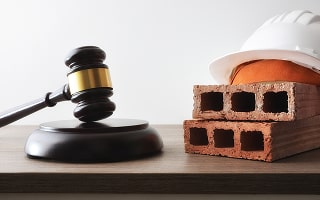
In Michigan, contractors who perform work on residential or combined residential/commercial structures generally need a Residential Builder's License or a Maintenance and Alteration Contractor License. These licenses are issued by the Michigan Department of Licensing and Regulatory Affairs (LARA). To obtain a license, contractors typically need to complete pre-licensure education, submit an application, and provide identification and proof of a Michigan business address.
A Residential Builder's License is required for contractors involved in the repair, alteration, addition, or improvement of residential structures. A Maintenance and Alteration Contractor License is needed for specific types of work like masonry, insulation, siding, or roofing, even if they are not working as a general contractor.
Contractors must complete a minimum of 60 hours of pre-licensure education for both license types. After getting the education, applicants must complete and submit the appropriate application form to LARA. Applicants need to provide copies of personal identification and proof of a Michigan business address.
In Michigan, a homeowner acting as their own general contractor for their own single-family residence does not need a license.
Michigan also licenses mechanical contractors, such as HVAC contractors, through the Bureau of Construction Codes, Mechanical Division.
If a handyman performs specific trades like masonry, insulation, siding, or roofing, they need the Maintenance and Alteration Contractor License. Contractors working without the required licenses can face severe penalties, including fines and jail time.
You can verify a contractor's license on the LARA website.
Insurance & Bonds
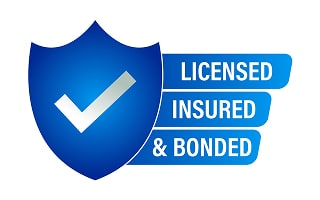
Michigan contractors must have general liability insurance of $1,000,000 per occurrence and $2,000,000 aggregate, almost 100% of the time. Contractors who employ others must also carry appropriate workers' compensation insurance. Additionally, contractors must have employer's liability insurance according to the amounts listed in the construction contract.
In Michigan, county-level authorities often require contractors to carry a Contractor Licensing Bond. Depending on the project, contractors may also be required to obtain a surety bond, which typically ranges from 1% to 5% of the total amount. The bond amount may vary, ranging from as low as $1,000 to significantly higher amounts. Contractors with excellent credit scores tend to pay less.
Public Works Contracts/Public Bidding

Michigan laws concerning public works projects primarily focus on ensuring contractor responsibility and public access to information. Legislation, such as Act 213 of 1963, outlines bonding requirements for contractors working on public projects, and Michigan's Freedom of Information Act (FOIA) ensures public access to records related to these projects.
Additionally, Michigan's Little Miller Act (which is part of Act 213 of 1963) applies to government construction contracts exceeding $50,000 and provides a way for subcontractors and suppliers to file claims if they are not paid for their work on public projects.
In Michigan, public works projects encompass construction, demolition, installation, or repair work funded by public funds. Governmental entities typically undertake these projects and can include infrastructure improvements such as roads, bridges, and water systems, as well as public buildings like schools, government offices, courthouses, and libraries. Parks, recreational areas, and other public spaces are also often part of public works projects. A key characteristic is that they are publicly owned and used, with public interest considerations taking precedence. Public works projects are primarily funded through public money, which can come from various sources like state and local taxes, federal grants, and bonds.
Some of the laws governing public works projects include:
- Prevailing Wage Laws
- Bonding Requirements
- Lien Restrictions
- Procurement and Contracting
Renovations
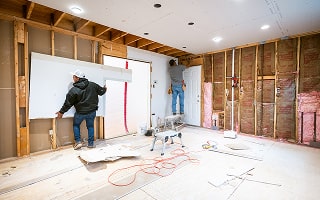
Michigan renovation laws are designed to ensure safety and quality of work. They focus particularly on lead paint and contractor licensing. Homeowners are responsible for obtaining the necessary permits before work begins. Contractors working on projects valued at $600 or more must be licensed.
Some key areas of Michigan's renovation laws include:
- Contractor Licensing: Contractors working on projects of $600 or more (including labor and materials) must be licensed. The licensing protects homeowners and ensures quality workmanship.
- Pre-Renovation Education: Michigan's Administrative Code requires that renovators of target housing (housing built before 1978) and child-occupied facilities provide homeowners with the EPA pamphlet "Protect Your Family From Lead in Your Home" or an equivalent approved by the Michigan Department of Health and Human Services. The document must be provided within 60 days of starting the renovation, and the homeowner must sign a written acknowledgement confirming receipt. If the renovator cannot obtain a written acknowledgement from an adult or occupant, they must certify in writing the address, date, and method of delivery that they used to provide it.
- Permits: Homeowners are legally responsible for obtaining the proper permits for renovations, not the contractor. Although the contractor or designer can apply for the permit, the homeowner should verify that it has been issued before work starts.
- Landlord Responsibilities: Recent Michigan Senate bills have focused on addressing landlord neglect, requiring landlords to repair hazardous issues within specific timeframes. Landlords are required to address mold, bed bugs, and pests within 72 hours of notification and make all repairs swiftly.
Environmental Laws

Michigan environmental laws for construction projects focus on protecting natural resources and preventing pollution during all phases of development. Some key aspects of environmental laws include obtaining permits, managing stormwater runoff, and controlling air and water pollution. Michigan's Natural Resources and Environmental Protection Act (NREPA) (Act 451 of 1994) provides the framework for environmental regulations.
Some highlights of Michigan's environmental laws include:
- Stormwater Management: Construction projects must have plans to manage and control stormwater runoff to prevent soil erosion, sedimentation, and pollution of water bodies. This often involves obtaining permits like those for construction stormwater, either individual or under a statewide general permit, from the Department of Environment, Great Lakes, and Energy (EGLE).
- Air Quality: Construction activities can generate dust and other airborne pollutants. Regulations may require measures to minimize dust emissions, such as watering down exposed areas or using dust control methods.
- Water Quality: Construction projects must avoid polluting surface and groundwater. This includes proper handling of hazardous materials, preventing leaks and spills, and managing wastewater from the site.
- Waste Management: Construction and demolition waste must be disposed of properly. This includes recycling materials where feasible and ensuring that any remaining waste is taken to authorized landfills.
- MEPA: The Michigan Environmental Protection Act (MEPA) allows legal action against any activities that harm the environment. The law permits citizens and other entities to sue if they believe a construction project is causing pollution or damage to natural resources.
- Permitting: Depending on the scope and nature of the project, various permits may be required from EGLE, such as air permits, water permits, and permits related to wastewater discharge.
- Reporting: Some construction activities require reporting to the relevant authorities about potential environmental impacts.
According to Michigan Administrative Code Rule 299.4504, a construction permit may require:
- A hydrogeological report and monitoring program.
- Engineering plans sealed by a registered professional engineer.
- Detailed information about the facility's location, including proximity to public roadways and structures.
- Plans for limiting access to the site.
- Details on how liquid waste will be collected, stored, and removed.
- General layout of equipment and flow patterns.
Solar Regulations
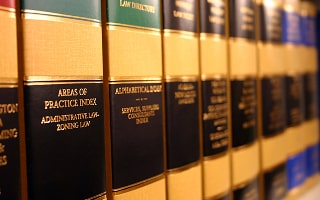
Michigan has specific regulations concerning solar panel installation and construction, particularly regarding homeowner association (HOA) restrictions and utility company interconnection. Recent Michigan legislation limits HOAs' ability to restrict solar panel installations, while also addressing how homeowners can sell excess energy back to utilities.
According to the Michigan Public Service Commission, "In Michigan, your solar array can be sized up to your energy usage from the previous year. This limit will determine a starting point for your solar array. Your array can be smaller based on your budget."
Some key aspects of Michigan solar regulations include:
-
HOA Restrictions: Michigan law prohibits HOAs from disallowing or excessively restricting solar panel installations. The law states that HOAs cannot restrict installations if the restrictions would increase the cost by more than $1,000 or decrease the system's output by more than 10%
-
Net Metering and Electricity Sales: Michigan allows homeowners with solar systems to sell excess electricity back to their utility company through net metering.
-
Local Permits: Homeowners must obtain necessary permits from their local jurisdiction for electrical work related to solar installations.
-
Oversizing: Michigan has rules regarding oversizing solar panel systems, particularly concerning inverter capacity. For example, a system can be up to 33% larger than the inverter's capacity.
-
Energy Policy Act: The Homeowners' Energy Policy Act (House Bill 5028) clarifies the limitations on HOA restrictions on solar installations.
-
"Clean" Energy Target: Michigan has a goal to have all electricity come from clean sources by 2040, which drives support for renewable energy like solar.
Gas/Oil

In Michigan, the use of oil and gas heating systems in construction is regulated by the state's building and mechanical codes and includes specific rules for fuel oil storage and handling. While natural gas is prevalent, especially in urban areas, oil heating remains an option, particularly in regions where natural gas infrastructure is less developed. However, the state has made a goal to be 100% clean energy by 2040.
Some of the highlights of gas/oil heating systems in Michigan include:
-
Michigan Residential Code (MRC): The MRC covers fuel gas piping systems, appliances, and venting in one- and two-family dwellings. It addresses installation, combustion, ventilation, and venting.
-
Michigan Mechanical Code (IMC): The IMC regulates the installation of all equipment and appliances in mechanical systems, including those related to heating.
-
Fuel Gas Piping: The MRC specifically addresses fuel gas piping systems, extending from the point of delivery to the appliance shutoff valves, and includes requirements for design, materials, installation, and testing.
-
Gas Appliances: The MRC covers the installation of gas appliances, including combustion and ventilation air, venting, and connections to piping systems.
-
Oil-Heating Systems: Oil-fired appliances must comply with relevant safety standards and regulations, including those related to fuel storage and handling. The Michigan Department of Licensing and Regulatory Affairs (LARA) regulates aboveground heating oil tanks.
-
Permits: Obtaining permits from the local building department is often required for the installation of fuel oil burners, tanks, and related equipment.
-
Air Quality Regulations: Depending on the capacity and sulfur content, boilers that use distillate oil or natural gas may require a Permit to Install from the Michigan Department of Environment, Great Lakes, and Energy (EGLE).
Electricity

Specific Michigan regulations and licensing requirements govern electrical work concerning construction and renovations. Generally, licensed electrical contractors perform electrical work, but homeowners can perform work on their own property for their own use. Specific rules also apply to power line clearances during construction.
Anyone performing professional electrical work in Michigan requires an electrical contractor's license issued by the state or municipality. Homeowners can perform electrical work on their own property for their own use, but they may need to provide proof of ownership and potentially obtain a temporary license.
Generally, licensed contractors must obtain permits for electrical work. Homeowners may need to obtain permits for their own work, especially if it's not considered minor repair or maintenance.
There are specific minimum clearance distances from energized power lines for equipment like scaffolding and ladders. For uninsulated lines, the minimum clearance is 10 feet. For insulated lines up to 300 volts, the minimum is 3 feet.
When establishing new electric service for a construction project, there's a process that involves submitting forms, fees, engineering appointments, and permits, as outlined by Midwest Energy & Communications.
Electrical permits are typically not required for minor repairs and maintenance, such as replacing lamps or connecting approved portable equipment to existing outlets.
Government Housing Programs
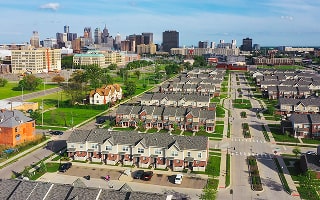
Michigan offers several government-funded housing programs designed to provide affordable and safe housing options for low-income individuals and families. These programs are administered through various state and local agencies and include options such as the Housing Choice Voucher Program (Section 8), Public Housing, and the Low-Income Housing Tax Credit (LIHTC) program.
Some of the programs offered in Michigan include:
- Housing Choice Voucher Program (Section 8): This program, funded by the U.S. Department of Housing and Urban Development (HUD) and administered by local Public Housing Agencies (PHAs), provides rental assistance to eligible low-income families. Participants can choose any eligible housing unit, and the voucher subsidizes a portion of the rent. In Michigan, the Michigan State Housing Development Authority (MSHDA) provides rental assistance for approximately 28,000 households through this program. However, due to high demand, Section 8 waitlists in Michigan can be very long, with some applicants waiting an average of 26 months to receive a voucher.
- Public Housing: Public housing provides safe and decent rental housing for eligible low-income families, elderly individuals, and people with disabilities. MSHDA, along with local housing agencies like the Detroit Housing Commission (DHC) and the Grand Rapids Housing Commission (GRHC), manages public housing units. The DHC manages approximately 4,000 units for seniors and families in the Detroit area.
- Low Income Housing Tax Credit (LIHTC): This program, administered by MSHDA, provides tax credits to developers who build or rehabilitate affordable rental housing. The credits incentivize the creation and preservation of affordable housing units across the state. Since its inception, over 20,000 affordable apartments have been created through this program.
- Rapid Re-Housing: This program focuses on quickly rehousing individuals and families experiencing homelessness or living in emergency shelters. It helps address the practical challenges of finding and securing permanent housing, thereby minimizing the time individuals spend homeless.
- Employer-Assisted Housing: Some employers in Michigan offer housing assistance to their employees, such as stipends or other forms of financial support to offset housing costs.
- Housing Tax Increment Financing: MSHDA also uses tax increment financing, which provides tax credits for projects that create affordable housing units.
Property Tax Credits and Incentives
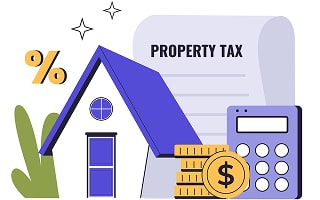
Some people living in Michigan find it challenging to pay their property taxes. The state has a few property tax credits/exemptions and incentives to make it easier. Some of the options available to Michigan residents are as follows:
-
Commercial Facilities Exemption: "A tax incentive for the redevelopment of commercial property located within an established Commercial Redevelopment District for commercial business enterprise purposes."
-
Charitable Nonprofit Housing Exemption: Designed to "exempt certain residential property owned by a charitable nonprofit housing organization from property taxes for a maximum period of five years if the property is intended for ultimate occupancy by low-income persons as a principal residence."
-
Disabled Veterans Exemption: For a homestead owned by a disabled veteran.
-
Principal Residence Exemption (PRE): "A property tax exemption for individuals that own and occupy a property as their principal residence."
-
Poverty Exemption: "An exemption for the principal residence of persons who, in the judgment of the local unit of government, by reason of poverty, are unable to contribute to the public charges."
-
Senior and Disabled Housing Exemption: "An exemption for certain non-profit, multi-unit housing property."
-
Supportive Housing Exemption: "An exemption for certain non-profit, scattered-site, single-family supportive housing property."
The above is only a short list of the available exemptions and incentives offered by the state of Michigan.
Local Level (Permits and Regulations)
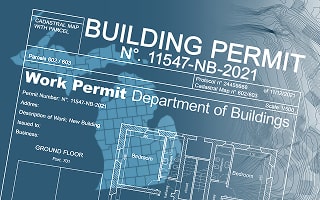
Michigan's local-level property laws concern property assessment, taxation, permits, and zoning. These laws are created and enforced by local government. Property is classified for tax purposes, and local assessors determine taxable values. Local governments also regulate property maintenance and may enforce building codes. Furthermore, property boundary disputes can arise and are often resolved through local courts. Michigan is a common law property state, meaning ownership is generally determined by the name on the title. However, legal doctrines like adverse possession and acquiescence can alter property boundaries based on long-term usage or agreement, potentially creating new boundaries. Landlocked parcels of land without recorded easements can also present unique property boundary challenges.
Building-Friendly Areas of Michigan

Although Michigan issues statewide building codes that local jurisdictions must adhere to, zoning laws make it harder or easier to build new construction or renovate. Some areas where it's easier to build in Michigan include:
- Macomb Township
- Southeast Michigan
- Northville
- Salem Township
- Traverse City
- Northern Michigan
Where to Obtain Michigan Building Permits
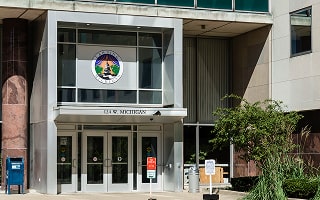
Most construction, including renovations, requires a building permit in Michigan. To obtain one, you must contact your local building department (city or county) and apply. There are specific rules within each jurisdiction, and you must pay fees as well. The general process is as follows:
- Determine if you need a permit or not.
- Locate the proper office within your jurisdiction.
- Determine the type of permit you need.
- Gather together supporting documentation (plans, contractor's license, blueprints, material list, etc.)
- Apply in person, online, or through the mail. Pay the fee along with your application.
- Wait for approval.
- Follow up and once approved, schedule your inspection.
Some links to other building departments in Michigan include:
- Cheboygan County Building Permits
- City of St. Joseph Building Inspection
- City of Kalamazoo Building Permits
- City of Midland Building Permits
- Clinton County Building Department
- Gratiot County Building Permits
- Independence Township Building Permits
- Manistee County Building Permits
- Otsego County Building Permits
During the permitting process, the building inspector must inspect the work being performed. They may do this before, during, and after the project to ensure the work complies with all local building codes to keep people safe. Depending on the city or county's rules, you may schedule your inspections through the online portal, by phone, or by email.
Zoning Laws
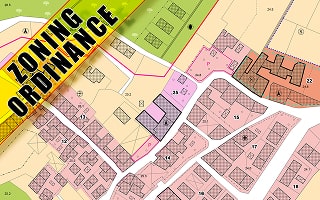
In Michigan, zoning laws are established by municipalities (cities, townships, and villages) to regulate land use within their boundaries. These laws dictate how properties can be used, ensuring that different types of land uses (residential, commercial, industrial) are separated and compatible within specific areas. Zoning can be strict or less strict depending on the region.
Local governments are responsible for zoning, which allows them to tailor regulations to their specific needs and community character. The purpose of zoning is to promote public health, safety, and general welfare by regulating land use, building height, density, and other factors. Local building departments typically enforce zoning ordinances. Some types of zoning include:
-
Use Regulations: Specifying which types of uses are permitted (e.g., residential, commercial, industrial).
-
Lot Size and Dimensions: Establishing minimum lot sizes, setbacks from property lines, and building heights.
-
Density Regulations: Limiting the number of dwelling units per acre in residential areas.
Individuals can request an exception to zoning regulations through a variance process if they can demonstrate hardship or unique circumstances. Property owners can also petition for a change in zoning district classification, where they must appear at public hearings and are subject to a review by the local planning board.
Tiny homes are allowed in Michigan, but regulations vary by location, and some areas may have specific restrictions on their size, construction, or location.
Some of the zoning designations used for land throughout Michigan include:
-
Residential: These zones are designed to support housing, with different densities allowed (e.g., single-family, multi-family).
-
Commercial: These districts allow for businesses, retail, and other commercial activities.
-
Industrial: These zones are designated for industrial uses, such as manufacturing or warehousing.
-
Mixed-Use: These districts combine residential and commercial uses in the same area, often with specific building or development requirements. span>
Related Links and Enforcement Offices

When it comes to Michigan construction, renovation, building, and housing regulations, many government departments and agencies standardize, regulate, and enforce building rules. There is some overlap with their duties, but most in Michigan are on the local level. The state agencies tend to set broad minimum standards, and then the cities, towns, and counties customize and adopt from there.
The links below provide detailed information on the state's construction, zoning, renovating, and housing rules.
Other Helpful Links
- Michigan Building Code (MBC)
- International Building Code (IBC)
- Bureau of Construction Codes (BCC)
- Stille-DeRossett-Hale Single State Construction Code Act
- Michigan Licensing Law
- Residential Builders' and Maintenance and Alteration Contractors' Board
- Construction Safety and Health Division
- Michigan Occupational Health and Safety Administration
- International Code Council (ICC)
- Natural Resources and Environmental Protection Act (NREPA) (Act 451 of 1994)
- Michigan Public Service Commission
- Michigan State Housing Development Authority